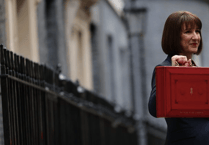This week it has been particularly tricky to pin down a subject upon which to moralise. Tragedy within Israel and Gaza explodes across all but the most trivial of ideas. Everyone is outraged. The usual suspects present their predictable views. No one seems hopeful. What can one helpfully insert into this unholy conversation?
Good Word columnist, the Baptist pastor Rob James offers us his Christian belief that ‘the day will dawn when the Prince of Peace will return to this sad, divided world’ and assuming this occurs, all will be solved. Even for a doubting Thomas like myself, I find Rob’s spiritual outlook uplifting. Reminiscent of my time living next to a Gospel Church in Manchester. Someone else’s joyous belief system shining uninvited light into my secular understanding of this often dark and confounding planet. Rob’s positive sentiments also remind me of the importance, but then the pitfalls, of humanity’s mishmash of unlikely faiths and bewildering beliefs.
So, what can we be sure of? It was Rene Descartes (1596–1650) who ventured “Cogito ergo sum”, “I think therefore I am”. From Descartes’ observation the inference is often made that personal existence is only fact we can be certain of; that everything else is a belief. But Rene was unaware of Artificial Intelligence. Arguably, it is now possible (or soon will be) to generate original thought within non-physical worlds. A kind of Matrix. Some claim there is a probability that our reality is an artificial universe. No longer, goes the argument, can personal existence be conclusively proved.
Yet in order to function we hold faith in a fundamental set of beliefs, primarily that we do exist. Family and culture complete an initial set. As our lives develop, more and more belief systems and ideas are presented to us and we each select those we feel are most convincing and then live our lives accordingly. For example, I believe that I am human, I live on a spherical planet Earth, I am currently sat at my writing desk trying to be relevant. If these beliefs are incorrect, for instance, my life and consciousness are in fact generated within the technology of another universe, nothing changes here. For me, this world is real and remains the only show in town.
And our reality changes with evolving understanding. For millennia, it was accepted that our Earth was flat. Priests and scientists all asserted the Earth was disc-like and believed we were at the centre of God’s Universe. Most of us now know better and inhabit a very different reality. So, the lessons from history are to proceed on the basis of what we believe, but to be cautious in our claims, particularly when leaning on ancient and out-of-date sources; that little is certain and everything should be questioned; that when our understanding of reality evolves, so should our beliefs.
Unfortunately it is rarely in the interest of politicians, ideologues, or priests to be cautious in claim or evolving in understanding. These vested interests make a living by claiming rights over an exclusive and intransigent truth. These vested interests speak to us in convenient certainties and are quick to contradict and ridicule one other. These vested interests pretend they have pretty much got the whole thing nailed down already. Are unwilling to abandon previous thinking when their positions are overrun by fresh or contradictory views. They insist on the one model they know. Vested interests exhibit little curiosity, no humility, little humanity, and are routinely proved wrong. Vested interests claiming an unlikely truth should be treated with extreme caution. ‘Truly, whoever is able to make you absurd is able to make you unjust’, said French philosopher Voltaire (1694 – 1778).
So what should we believe in? you ask. Believe in the likely and the positive, say I. For example, I am adopted and arrived into my adopted Welsh family at the age of 10 days at the end of 1964. I have no knowledge of my natural family except a few names and a warm letter from my Grandmother giving me the vaguest details of how I came to exist. I have spent considerable time wondering what occurred back then but have no evidence to support any belief that I care to hold. In the absence of evidence why does it matter what I believe? Let me tell you why.
I choose to believe that my natural mother clutched me tight for nine days and that she could barely take her eyes from my tiny tiny form. I believe that she breathed love onto my face and kept me warm. I believe the notion to abandon me was far from her thinking. I believe she cried like no other mother has cried when they came to take me away. I believe that she regularly thinks of me. She wonders what I am doing and who I have become. She has hopes for me. She loves me. Still weeps. All likely and all positive.
I could believe that my natural mother did not want me. When I was born she dismissed me and did not touch me nor look at me. I could believe that she hated me for causing her family anguish and for the inconvenient pain of my entrance. She remembers me only occasionally and then as a childhood trauma. She hopes that I never embarrass her by making contact. She abandoned both me and any thoughts for my future the moment I was delivered.
Which of these two opposing narratives I choose to believe affects aspects of my life including how I feel about myself and who I am to others. As our beliefs are so influential, it is logical for the sake of personal well-being, and in absence of contradictory evidence, to believe the positive story.
Amid current challenging realities, I still need to believe in the best story - that ‘the arc of history is long but bends towards justice’. It is often a depressing and desperate arc, but to a positive end, the step-by-step intention must be to remain hopeful and to leave this world, our society, each place we go, and every person we meet, slightly better than we found them.




